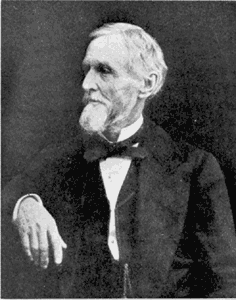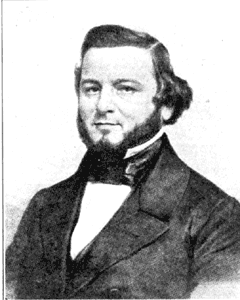| Home -> James H. Barry Press -> The Great Diamond Hoax - Chapter VI | |||
|
Chapter VI.
Perilous Trip Across Mexico and Voyage on Blockade Runner Enter Into Narrator's Experiences on Visit to Jefferson Davis. Southerners in California Form Plan to Intercept Gold Shipments on Pacific Mail Liners from San Francisco to Capital. I was broken-hearted at the turn of affairs in California. Needless to say, I was one of those who voted "yes" on the memorable night when the committee disbanded. The actions of General Sumner, which were needlessly severe and autocratic, tended to make the tension more severe. Just for some idle expression of sympathy for the South, all sorts of really inoffensive people were clapped into Alcatraz and subjected to indignity and loss. President Lincoln later on realized that Sumner was only making matters worse and sent General Rice to relieve him, who at once adopted a policy more pacific and wise. But this is no part of the story. The idea of interrupting the gold shipments by the Pacific Mail, very essential to the Government at Washington, again took form. This was to be effected by seizure on the high seas. A number of prominent men were interested and I was requested to become one. I had no stomach for downright piracy, though ready for any risk. I stipulated that I must first receive a regular commission from the Confederate Navy. This being agreed to, the sum of $250,000 was subscribed, of which $50,000 was mine. In company with H. T. Templeton, a well-known Californian, later a familiar of the Crocker family, we traveled by steamer to Acapulco. Mexico was then in an uproar over the threatened French invasion. The American Consul, a son of John A. Suter, advised us that it was little short of madness to cross the country to Mexico City, which we gave as our destination. But Templeton was brave as a lion and I was young, reckless and confident in my luck. Heavily armed, with a single guide, who, by the way, fled in terror at the first sight of danger, we set out on a venturesome journey. That trip would make some story by itself. We had several pitched battles with small bands of "ladrones" or robbers. Once both our horses were shot from under us. My previously acquired knowledge of Spanish stood us in good stead in securing fresh equipment, knowledge of the way and sometimes hospitality, and shelter. Finally, after great hardships and danger we reached Mexico City, and thence proceeded without incident to Vera Cruz, which was a sort of rendezvous for blockade runners. Here Templeton and I parted company with mutual regrets. He took a ship for New York and returned to California. I boarded a blockade runner and during a rainy night we slipped past the Federal warships into Charleston. I had no difficulty in reaching Richmond, Virginia, the Confederate capital. It was a vast, hustling, military camp. Troops were marching and countermarching, officers on horseback dashing to and fro on mysterious missions and everywhere the atmosphere of war. It was a couple of days before I saw President Jefferson Davis. I laid my plans before him fully, to his great interest, and later we had several interviews. He did not come to a swift conclusion. To my way of thinking at the time he was over-deliberate in making up his mind. That was a youthful illusion. I think of him now as a very great man, lacking only one thing - luck. He fully realized, the importance of shutting off the great gold shipments to the East from California. President Davis said it would be more important than many victories in the field. At the same time, he saw grave difficulties in the way. He did not believe that a vessel could be outfitted for the purpose in any of the Pacific ports without arousing suspicion, disclosure and capture. He warned me that my associates and myself were taking an awful risk, almost sure to result in ultimate disaster. Moreover, he was uncertain whether under any circumstances the enterprise could be justified under international law and whether the proceeding would not fall under the head of piracy, against which he resolutely set his face. All these questions were submitted to one of his Cabinet officers, Judah P. Benjamin. Mr. Benjamin was of Jewish ancestry and one of the ablest men who guided the way of the Confederacy. After the general breakup, he escaped to England, became a leader of the bar of London, counsel to the Queen and won the highest honors of his profession before he died. This distinguished gentleman examined with great care the questions involved, particularly on the piracy point, and he gave an opinion that it would be entirely within the scope of international law to equip and sail a vessel out of any port of the United States provided no overt act against commerce were committed before a foreign port was reached, letters of marque exhibited there and the open purpose of those in command declared. So for what followed I had at least the advice of eminent counsel and I still believe that the advice was absolutely sound. In due course of time I received a commission as a captain in the Confederate Navy. I had never been on a man-of-war in my life, but that made no difference. A fresh water naval hero may be as good as the salt water kind. Also I received letters of marque in blank, the names to be filled in when the vessel reached a foreign port. Besides that I was intrusted with quite a bundle of mail, addressed to leading Southerners in California and doubtless of a highly compromising character. This literary consignment nearly got not only myself but many other people into a peck of trouble, which I might as well tell of now, although it is somewhat ahead of my story. Returning to California, liking not the route through Mexico, I had the blockade, runner land me at Aspinwall, where I joined the passengers of a Pacific Mail liner and embarked at Panama for the run north. As we were approaching San Francisco I became uneasy about my documents, fearing that enough about my movements might be known to cause a close personal search. On board the steamer was a lady long famous in California, Mrs. Charles S. Fairfax. Her husband was the lineal Lord Fairfax of the British peerage. She was a niece of John C. Calhoun, a woman of great beauty, wit and resourcefulness and an intense Southern sympathizer. We became rather confidential on the way up and I told her about the package and my fears. "Why, what stupid fools men are, anyhow," she laughed, "give that package to me and set your mind at rest." The suggestion looked good, for, of course, I could assume responsibility if the documents were found. That night Mrs. Fairfax left her door just a bit ajar and as I passed it something was slipped to her. No one saw the transfer. When we reached San Francisco what I feared came true. Not alone my luggage, but my person were subjected to a search that hardly overlooked my soul. While I was in the hands of the minions of the law, who seemed sadly disappointed over their fruitless quest, Mrs. Fairfax swept by in her stately way; all the same I seemed to catch a twinkle of humor in her eye. Two days later, the lady handed me the package. The seals were broken, but the contents intact. "You gave me a lot of bother," said the lady, "I had to sit up all night sewing these wretched papers in my dress. What was worse still, I never dared to change it. Just imagine what the other women thought of me." I passed the letters around to various leading lawyers, bankers, financiers, and so on. Without mentioning any names I told them how near they came to falling into Federal hands. Many a cheek paled and jaw dropped as they heard the story. We have been told much of what women did for the North, very little of what the women did for the South. That is a noble and inspiring story that remains to be told. But to return to Richmond. The Confederate cause seemed at its zenith. Everywhere was abounding confidence in the final result. And now came a whisper that a great battle would soon be fought that ought to be decisive. I was eager to see something of the war game and with letters from the Secretary of War, hurried westward, arriving at Corinth, Miss., on April 4, 1862. Here a small Confederate army was assembled under the same Albert Sidney Johnston, not exceeding 5,000 men. Nine miles away, General Grant was encamped at Shiloh with 35,000 men, confidently awaiting the arrival of General Buell with 30,000 more, to begin the invasion of the South. At the risk of criticism by experts I am going to tell briefly what a great, old-fashioned battle seemed like to a raw looker-on. |
|||
 Jefferson Davis The able and illustrious leader of the lost cause. |
|||
 Judah P. Benjamin One of the ablest Confederate Statesmen. |
|||